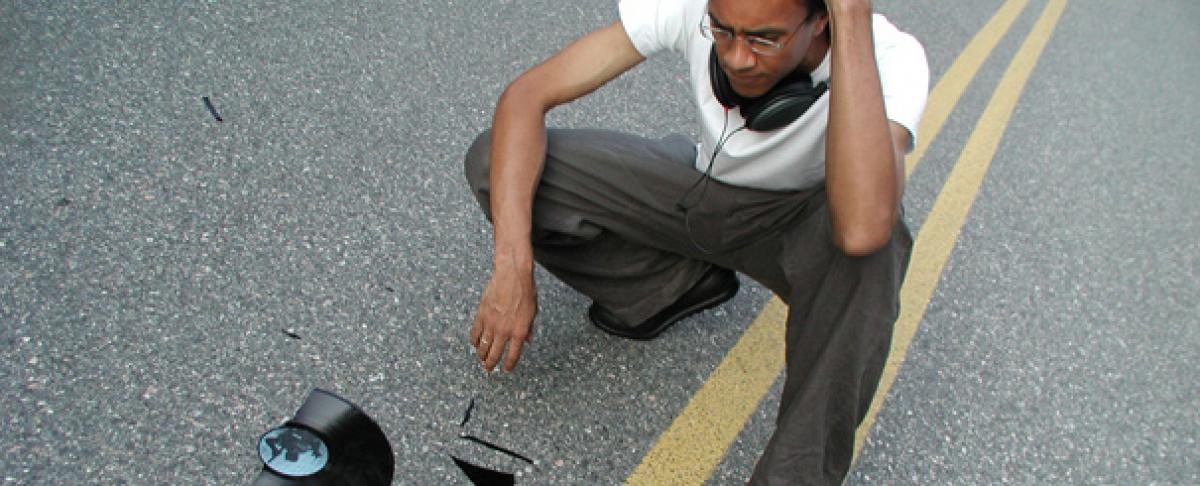
Global Ghettotech
The Brazilian journalist Camilo Rocha interviews the ethnomusicologist, DJ and Norient writer Wayne Marshall about the latest musical trends around the globe: reggaeton, kwaito, kuduro, and grime.
[Camilo Rocha]: You are a music ethnomusicologist. How did you get into that area? Where did you study? Are you doing any academic work at the moment?
[WM]: I was inspired to become an ethnomusicologist when I discovered the field my senior year in college (I was an English major). I took a class on music and race in the US with Ron Radano and ended up studying with him in graduate school at the University of Wisconsin-Madison. It was a real epiphany to discover that I could keep music central in my life and approach it from an intellectual / scholarly angle. Currently, I’m teaching at Brandeis University in Boston, offering courses on hip-hop, music and globalization, and «digital pop».
[CR]: Explain «global ghettotech» to those who don’t know what it is about.
[WM]: «Global ghettotech» is a phrase I came up with to describe what seems like an emerging aesthetic among certain DJs and bloggers. I’ve also called it «nu whirled music» to describe its (antagonistic but derivative) relationship to «world music» as well as the importance of fusion (mixing «global» genres such as hip-hop, techno, reggae, etc., often with «local» styles) in the concept. For me, global ghettotech describes the recent interest in such genres as funk carioca, kuduro, reggaeton, juke, grime, kwaito, etc. – genres identified with the ghettos of the former colonies as well as with the ghettos of today’s post-colonial metropoles. I want to stress that I use the term somewhat critically – I don’t mean simply to celebrate this kind of engagement. One thing I find really problematic about it, for example, is the flavor-of-the-month approach to engaging with «other» musics: e.g., «kuduro is the new baile funk!» When it becomes a surfacy, fashionable pursuit, it gets more problematic, for me, than when it is about finding new sounds in different places and really getting to know them and the social and cultural contexts that shape them – and in the process, learning about one’s own place (and, usually, privilege) in the global order.
[CR]: How do you see the popularization of «global ghettotech»? Why has there been so much exposure and interest for these types of sounds?
[WM]: I think a lot of it has to do with the advent of technologies that make it possible for people to produce music all over the world (e.g., FruityLoops) and to circulate music rather widely (e.g., the Internet, blogs, mp3s, p2p). In terms of interest, I think some of it has to do with a certain familiarity (i.e., hearing hip-hop and techno with new accents) and some of it has to do with seeking out the exotic (as with «old» world music).
[CR]: I can see a lot of people here in Brazil viewing all this as a new kind of exploitation: guys from the first world shopping around ghettos of the globe in search of the new rhythms to feed their DJ sets, getting credit and fame while the original artists are not mentioned or soon forgotten. Is that fair or not to say?
[WM]: I think that’s definitely a fair statement in some cases, but it’s important to look at the individual and how he or she engages with the people in the places from which those sounds come. Collaborating with people in Rio or Kingston is a lot different from downloading them. In that respect, there are plenty of elite or middle-class Brazilians who could be just as guilty of this sort of exploitation.
[CR]: Does «global ghettotech» sometimes run the risk of being just a trendier guise for the rich world’s old taste for «exotic» (cultural tourism thrills as opposed to understanding and identification with the scenes it is exploring)?
[WM]: Yes, definitely. And not just sometimes – a LOT of the time.
[CR]: How is the acceptance in America for this kind of musical approach?
[WM]: I’d say it’s still fairly marginal. It’s not as if this kind of music – even as projected by MIA or Diplo or Ghislain or /Rupture – is mainstream by any stretch. You don’t really see it on MTV or hear it on the radio. It’s mainly an internet phenomenon and confined to a few clubs nights / parties in big cities like New York, Montreal, Boston, etc. For the weekly that I do in Boston with DJ Flack, «Beat Research», we play all kinds of genres, often touching on many that might fall under the «global ghettotech» umbrella, and we’ve got an open-minded audience that likes that sort of thing, but it’s still a pretty small scene.
[CR]: Do you do a lot of travelling for music research? Tell us a couple of interesting stories about your travels.
[WM]: When I’m lucky enough to find funding, I love to travel to new places and check out their soundscapes and pay attention to what is local and what is global and how people negotiate the two. I’ve spent a good amount of time in Jamaica, both doing research and collaborating with artists there (and I’ve written a lot about it on my blogs). Recently, I had the good fortune to spend several days in Rio, which I had been wanting to do for many years. I’m afraid I don’t have the time to go into many stories, but I often find that music is a great way to connect with people, especially when we share a love for, say, hip-hop or reggae and thus share a musical language, even if we don’t always share a spoken language.
[CR]: A lot of ghetto music bypasses copyright as it is commonly made on pirated software and samples freely. Meanwhile, illegal downloading is threatening the music industry as we know it. Do you think we are going in an inevitable direction, where music will become free? Will that be a good thing and why? Should music have a price? Do you manage to make any money selling music?
[WM]: These are very big questions, and it’s hard to say. It does seem like we’re moving in that direction, but there are many ways to commercialize music – selling recordings is a relatively recent way for musicians (or more commonly, record labels and publishers) to get paid. I think that performance will remain an important way for musicians to earn a living. I’m not sure whether music should have a price. I generally don’t believe in monetizing or propertizing things, music included, but I think I’m in the minority on that one. I’m glad, at any rate, that musicians continue to do what they do without much regard for outmoded copyright structures. Some – perhaps most! – of my favorite music is «illegal» music. Personally, I don’t make very much money selling music, which is perhaps part of the reason why I’m not very invested in music having a price. Most of the money I earn through music is from playing gigs, usually DJing, though I can’t say that I make a lot – hence the academic day job.
[CR]: Do you sometimes feel there should be more political lyrics in global ghetto music (I’m thinking of Rio funk, reggaeton, kuduro and kwaito which are largely sexual and/or party-oriented)? Or maybe feel that these musics could have more of a commitment to change or denounce their situation (if you think they do promote some kind of social change, please explain why)?
[WM]: Sometimes I might feel that way, but then again, I think that music about sex or pleasure or partying is already political in a certain sense. It depends very much on the social or cultural context, of course. It’s no surprise that the themes that dominate a lot of ghetto music have to do more with everyday concerns, or with transcending the stress of everyday life, or with pissing off the middle-class, the government, the power structure. As for promoting change, sometimes one sees that sort of thing, especially in the Rasta-inspired visions of a lot of reggae, but in general, people living in ghettos worldwide haven’t seen much change, don’t see much hope for change, and probably won’t change the focus of their lyrics until there is some real change in the social conditions in which they live. I guess it’s something of a chicken and egg question, but it’s not for me to tell people what to rap about. Of course, as a DJ it can often be uncomfortable to play songs that are overtly misogynist or which objectify women as sex objects (and little else). Perhaps that’s another significant appeal of «global» / foreign ghettotech: it’s easier to listen to booty music when you don’t understand all the words.
[CR]: What new stuff (styles/artists/producers) have you discovered recently that has really impressed you?
[WM]: I’ve been really impressed with a lot of the young juke producers coming out of Chicago: DJ Nate and DJ Clent especially. All the dance crazes on YouTube have also been very exciting. And the rise of interest in cumbia, reggaeton, and other music en español seems promising too. Part of me really wants to see the US come to terms with its postcolonial, imperial self, and I feel that music can help to express a kind of cultural politics of conviviality that feels more and more needed in our polyglot cities. In general, I just love hearing people making music without much regard for the rules. I love DIY, p2p music and the internet has been making more and more of that available – and, even better, has been making it possible to connect directly to these producers rather than having to deal with all sorts of middlemen.
[CR]: You said you just came back from Rio. Were you on holiday? Any interesting musical experiences?
[WM]: I was there for a small meeting of musicians convened by the Future of Music Coalition to discuss, um, the future of music (e.g., media consolidation, internet opportunities, copyright issues, etc.). It was an honor and a pleasure to be there, among such company. So, not exactly a holiday, but very fun «business» for sure. I’ve been listening to music from Rio for many years – and not just funk, but samba, bossa nova, tropicalia, etc. – and so it was great to finally get a chance to see and hear the city. It felt like a really vibrant place, really «on». I was amazed by the number of people partying in Lapa until the wee hours. I also had a wonderful time hanging out in the favela of Vidigal for most of an afternoon and evening. It felt like a warm, welcoming place, and it was great to hear some funk in its social context.
[CR]: What are your plans for the future?
[WM]: Keep on teaching and writing and DJing, and hopefully getting back into more producing. I aways let my interests lead me where they may, though, so we’ll see…
First, this interview appeared in spannered.
Published on June 13, 2009
Last updated on May 01, 2024
Topics
Digitization means empowerment: for niche musicians, queer artists and native aliens that connect online to create safe spaces.
Can a bedroom producer change the world? How do artists operate in undersupplied conditions?
Why Asia is not a continent and how the aesthetics of the NON Worldwide collective create new utopian notions of multi-centred origins.
From Korean visual kei to Brazilian rasterinha, or the dangers of suddenly rising to fame at a young age.

